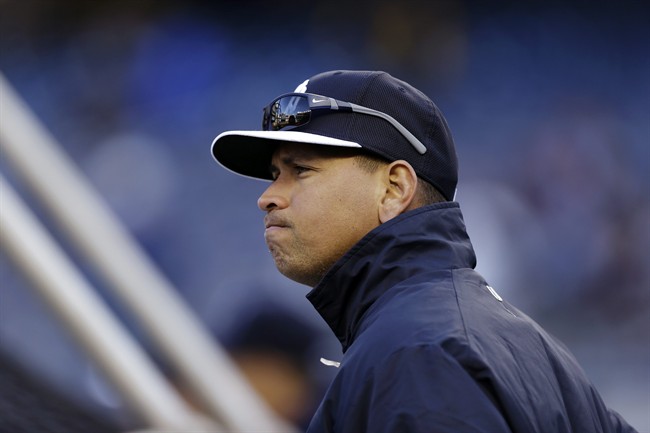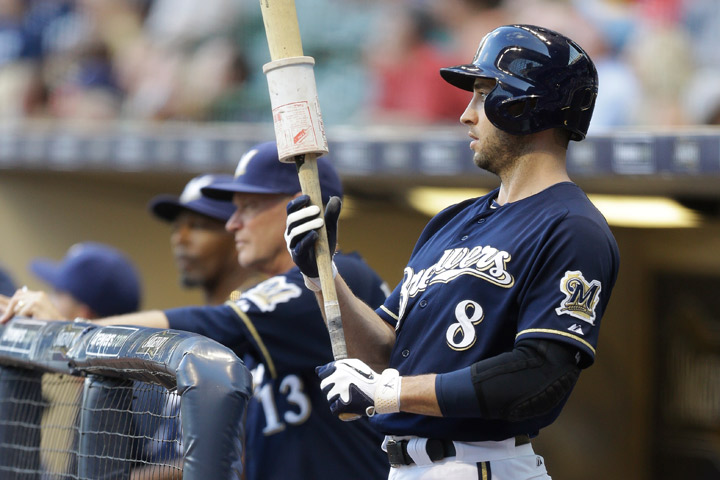TORONTO – Ryan Braun, the 2011 National League MVP, was suspended without pay for the rest of the season and post-season due to unspecified “violations” of both baseball’s drug program and labour contract.

Major League Baseball (MLB) Commissioner Bud Selig announced his penalty, following a January report alleging Braun—along with Yankees star Alex Rodriguez and more than a dozen other players—were connected with a Florida clinic accused of distributing performance-enhancing drugs (PEDs).
New York Magazine writer Joe DeLessio believes Braun’s suspension is bad news for A-Rod, pointing to the fact that Braun’s suspension shows that collective bargaining punishments (50 games for first-time drug test failures, 100 games for second-time offenders and lifetime bans for third-time offenders) are easy enough to overrule.

“Both Braun and A-Rod, officially, have no priors: Braun failed a test once but won his appeal and avoided punishment because of how his sample was handled. And though A-Rod admitted to PED use after a 2009 report said he’d failed a test in 2003, that test occurred during the league’s supposedly anonymous survey testing, which was conducted to determine whether full testing (with punishments) was necessary,” wrote DeLessio.
But Braun’s 65-game suspension is more than the first-time offender’s prescribed punishment of 50 games—his penalization was not for a positive drug test, writes the New York Times, and therefore lies outside collective bargaining punishments.
“Take a moment, by the way, to consider how illogical all of this is: A failed drug test, i.e., indisputable evidence, gets a player 50 games. But without that indisputable evidence, the league can actually hand down longer suspensions if it doesn’t like what it finds,” wrote DeLessio, who added “the sky’s really the limit for a potential punishment for A-Rod,” who reportedly has even more evidence against him than Braun did.
Many fans and past players believe lifetime bans should be introduced in order to curb the problem of PEDs in the sport. Dale Murphy, who won two MVP awards in the 1980s and now runs the I Won’t Cheat foundation, coached Braun at the World Baseball Classic in March. He told the New York Times he wanted to believe Braun was innocent, but has ended up disappointed.
“To get this under control, you’ve got to put the fear of ending a guy’s career into the equation,” Murphy told the NY Times. “Even with Ryan Braun’s suspension, and with A-Rod’s coming up, it’s not going to end it.”
Bleacher Report writer Dan Levy believes the onus shouldn’t lie only on the players.
“If MLB really wants to clean up the game and eradicate performance-enhancing drugs from the league, Bud Selig and his coalition of narcs shouldn’t just go after the cheaters,” he wrote. “They would be wise to start punishing teams for harboring the cheaters.”
Levy suggests Braun’s 65-game suspension—leaving the Brewers without one of their best hitters—isn’t close to being punitive enough for the team; since the team is in last place with only 41 wins this season, his removal will barely have an impact.
“If Alex Rodriguez is suspended for this year or longer—some have suggested MLB may seek a lifetime ban—that would actually help the Yankees by enabling them to get out of his oppressive contract,” wrote Levy.
The sports writer facetiously suggests vacating the team’s wins for the duration of time a player is caught cheating, retracting division title banners or even taking away the Yankees’ 2009 World Series win if it comes out Rodriguez was doping in 2009. He wrote the idea isn’t as “ludicrous” as it sounds.
“The NCAA routinely vacates teams records for violations of single players. Chris Webber’s involvement with receiving money from a booster forced Michigan to vacate its Final Fours, pulling the banners from the rafters. Reggie Bush’s free house or whatever money nonsense he was involved in led to USC vacating an entire season that included a national championship. One player can ruin everything in college athletics, so why not in the pros?”
Though Levy admits there’s “no way” a World Series win would be retracted, he offers another possible punishment: deny teams who employ cheaters the ability to replace the player on the 25-man roster.
ESPN’s sports show Outside the Lines reported other players who may face discipline from MLB related to the Miami Biogenesis clinic include: Toronto’s Melky Cabrera, Bartolo Colon, Yasmani Grandal, Nelson Cruz, Francisco Cervelli, Jesus Montero, Jhonny Peralta, Cesar Puello, Fernando Martinez, Everth Cabrera, Fautino de los Santos, Jordan Norberto and a number of other players who either are identified by code names or whose names appear in other documents not obtained by the ESPN investigation.
But the level of punishment remains up in the air—especially for Rodriguez.
“If the evidence against A-Rod is as strong as it’s reported to be, and knowing what we do about how baseball is targeting players it feels has embarrassed the league, Rodriguez could be in real trouble,” DeLessio suggested.
“Baseball might want to do more than just suspend him. It might want to make an example out of him.”
With files from The Associated Press


Comments